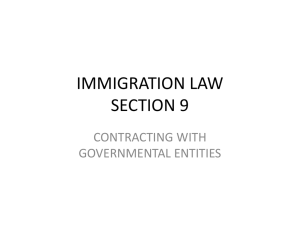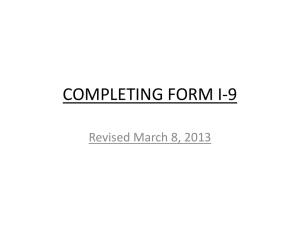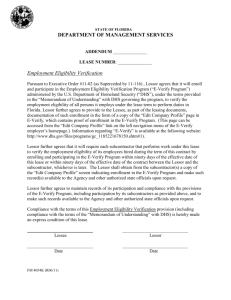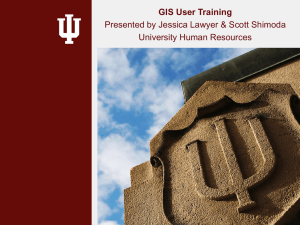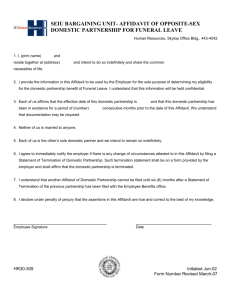Everify SAVE Title VI Presentation
advertisement
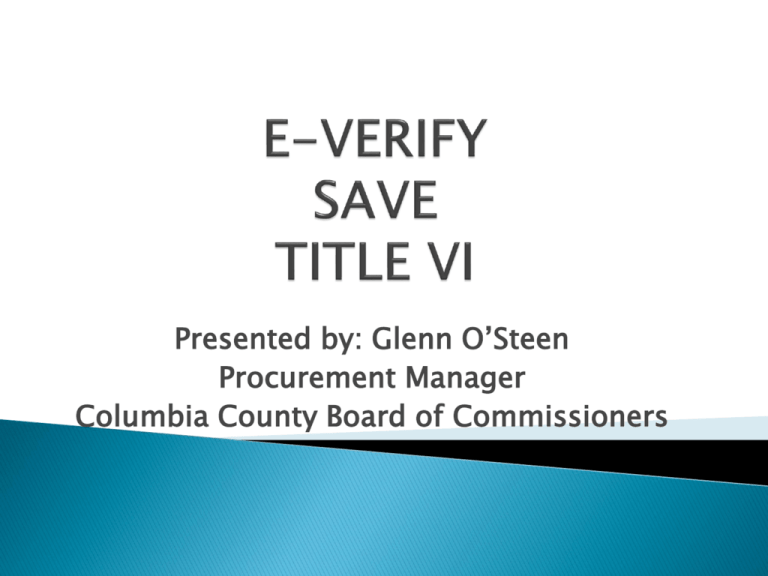
Presented by: Glenn O’Steen Procurement Manager Columbia County Board of Commissioners E-Verify ◦ County and City Usage ◦ Contracts ◦ Private Employers SAVE Enforcement Title VI Question and Answer Session It is a Web-based system that electronically verifies the employment eligibility of newly hired employees. E-Verify is a partnership between the Department of Homeland Security (DHS) and the Social Security Administration (SSA). U.S. Citizenship and Immigration Services (USCIS) oversees the program. It works by allowing participating employers to electronically compare employee information taken from the Form I-9 (the paper-based employee eligibility verification form used for all new hires) against records in SSA's database and the records in the DHS immigration databases. E-Verify is used to verify the employment eligibility of U.S. and non-U.S. Citizens SAVE is used to verify the legal status of nonU.S. citizens to determine eligibility for public benefits Register and Participate in the Federal EVerify Program Require All New Employees to Complete an I9 Form Maintain a Current E-Verify Account Post E-Verify Number and Authorization Date on Website All new employees ◦ Cannot be used for screening potential employees ◦ Cannot be used for existing employees Current Form I-9 Employment Eligibility Verification can be found at: http://www.uscis.gov/files/form/i-9.pdf Initial verification will return one of three results within seconds: ◦ Employment Authorized The employee is authorized to work ◦ SSA Tentative Non-Confirmation There is an information mismatch with SSA ◦ DHS Verification in Process DHS will usually respond within 24 hours with either an Employment Authorized or DHS Tentative Non-Confirmation E-VERIFY PROGRAM August 6, 2008 13 If Employment Authorized, the employer records the systemgenerated verification number on the Form I-9 or can print out the EVerify Confirmation Sheet and attach to the Form I-9. If Tentative Nonconfirmation, the employee can contest the finding and then: ◦ Social Security Number mismatches are resolved with SSA ◦ Non-citizen status mismatches are resolved with DHS If the employee chooses not to contest, it is considered a Final Nonconfirmation and the employer may terminate the employee and resolve the case. E-VERIFY PROGRAM August 6, 2008 15 Inform the employee and print and review the TNC notice with the employee. The employee chooses to “contest” or “not contest” the TNC. Refer the employee to the appropriate agency if the TNC is contested. The employee has 8 Federal Government workdays from the date of referral to visit or call the appropriate agency to resolve the discrepancy. Employee continues to work while the case is being resolved. Once the employee resolves the discrepancy in his or her records, they should inform the employer. With both a SSA TNC and a DHS TNC, a response is electronically sent to the employer through the system. The employer should check E-Verify periodically for the response. The employer will receive one of three results: ◦ Employment Authorized ◦ Final Nonconfirmation ◦ Review and Update Employee Data then Resubmit The employer then resolves the case in E-Verify. • Must maintain photocopy of Employment Authorization Document (EAD), Permanent Resident Card (“green card”) or U.S. Passport or Passport Card if presented by employee on Form I-9 • Must maintain E-Verify Confirmation Sheet with employee’s Form I-9 http://www.uscis.gov Contact DHS at E-Verify@dhs.gov or at 888-464-4218 Register for and use E-Verify Require all new employees to complete an I-9 Form Maintain a current E-Verify account Verify all new hires within 3 business days of hire Applies to All Public Employers Applies to all Contractors, Subcontractors or Sub-Subcontractors with Employees who Contract with Public Employers Relates to Contracts for the Physical Performance of Services "Physical performance of services" means the building, altering, repairing, improving, or demolishing of any public structure or building or other public improvements of any kind to public real property within this state, including the construction, reconstruction, or maintenance of all or part of a public road; or any other performance of labor for a public employer within this state under a contract or other bidding process. Attorney General’s Advice to State Agencies Applies to public works contracts and contracts for the maintenance, operation and repair of buildings or structures When in doubt, ask for an affidavit Must state that Contractor is registered for and using E-Verify Must contain User ID Number and Date of Authorization Must guarantee that Contractor will use EVerify throughout the duration of the contract period Must guarantee that Contractor will only contract with Subcontractors who present EVerify Affidavit Must be signed and notarized Counties and cities are responsible for the Contractor Affidavit Contractors are responsible for the Subcontractor Affidavits Subcontractors are responsible for the SubSubcontractor Affidavits Department of Audits and Accounts Website http://www.audits.ga.gov/NALGAD/section_3_ affidavits.html No Affidavit Required Must provide a copy of the state issued drivers license or ID (only from states that verify immigration status and are approved by the AG’s Office) If employees are hired at a later time, must comply with E-Verify Affidavit requirements Every public employer must submit an EVerify Contractor Report annually to the Department of Audits by December 31st Public Employer’s E-Verify Number Public Employer’s Date of Authorization to use E-Verify Legal name, address, and E-Verify Number of Contractor Date of the contract between Public Employer and Contractor Contracts for the physical performance of services, which must include: ◦ Public Works Contracts ◦ Contracts for the maintenance, repair and operation of buildings and structures Discuss further broadening of scope of reported contracts with your county or city attorney O.C.G.A. §13-10-91(7)(A) states, in part, “Not later than December 31 of each year, a public employer shall submit a compliance report to the state auditor certifying compliance with the provisions of this subsection. Such compliance report shall contain the public employer’s federal work authorization program verification user number and date of authorization and the legal name, address, and federal work authorization program user number of the contractor and the date of the contract between the contractor and public employer.” The Georgia Department of Audits and Accounts is working to develop a 2012 template for use by state agencies and political subdivisions that complies with the requirements of this provision and that may be submitted either electronically or by mail. This webpage will be updated once the approved template and transmission methodology are finalized. Once you have accessed this page, click on “Compliance Report Template and Instructions” located under the Section 3 information. After clicking on that tab, you will land on the instructions page. The report form is located on a separate tab located to the left of the instructions tab labeled “Report Form.” Review the general instructions located under the “Report Form Instructions” tab and send the email request to the Department of Audits for instructions on how to submit the report electronically. To request the electronic instructions, send an email to HB_87@audits.ga.gov with the subject line “Request HB 87 Instructions.” Contact the Department of Audits at 404656-9145 or at HB_87@audits.ga.gov. If any violations found, given 30 Day Period to correct deficiencies • Failure to correct = Exclusion from List of Qualified Local Governments Penalty in place until all deficiencies corrected Public Employer Penalties: • Appeal Rights to Office of State Administrative Hearings • Penalties and time to correct tolled until Final Ruling Public Employer Penalties: • Actions by County Constitutional Officer cannot form basis of any violation Penalty for any person who knowingly makes a false statement on an Affidavit: • Guilty of obstruction of public administration • Can be fined up to $1,000.00, imprisoned for at least one year but not more than five years, or both • Any Contractor or Subcontractor convicted for false statements will also be prohibited from bidding on or entering into any public contract for 12 months following such conviction • Such persons or entities will also be listed on www.open.georgia.gov No person can be held civilly or criminally liable for unknowingly accepting a bid from or contracting with a contractor, subcontractor, or sub-subcontractor who is violation the law Presumption that Public Employer, Contractor or Subcontractor relies on Affidavit in Good Faith The Department of Audits is required to conduct compliance audits on at least half of reporting agencies and publish the results annually by September 30th The Department of Labor is required to conduct 100 random audits of public employers Require all contractors hired for the physical performance of services to sign and submit an EVerify Contractor Affidavit Maintain all E-Verify affidavits for 5 years Submit annual compliance report to the Department of Audits by December 31st Only hire individuals/businesses with no employees for contracts for the physical performance of services if they are from a verification compliant state as authorized by the AG’s office E-Verify Requirements for Private Employers House Bill 87 phases in new E-Verify Mandate for Private Employers in Georgia: • January 1, 2012 for employers with more than 500 employees; • July 1, 2012 for employers with 100 or more employees; • July 1, 2013 for employers with more than 10 employees. Before issuing or renewing a business license, occupation tax certificate, or other documents required to operate a business, the city or county must require the private employer to: ◦ Submit an affidavit that they are registered and using E-Verify OR ◦ Demonstrate they are not covered by the law The AG’s Office Website http://law.ga.gov/immigration-reports Submit report to DCA annually by December 31st beginning on December 31, 2012 Must identify each license and certificate issued during the previous 12 months. Once private employer has submitted the affidavit with their E-Verify number, they can ONLY renew with the same number Exception: They can renew with another EVerify number if they provide a sworn document explaining the reason for a new or different E-Verify Number Penalties for failing to comply with E-Verify Mandate: • Employer or government official can be found guilty of Misdemeanor for providing false information Penalties for submitting false or misleading Affidavit: • Guilty of obstruction of public administration • Can be fined up to $1,000.00, imprisoned for at least one year but not more than five years, or both Potential Defenses: • Acted in Good Faith • Made reasonable attempt to comply Authority of Georgia’s AG Office: • Can investigate requirements and bring criminal and civil actions • Must provide employer 30 days to comply with mandate for good faith violations The Department of Audits is required to conduct compliance audits for 20% of reporting agencies Require all private employers (as they are phased in) seeking an occupation tax certificate/business license or other required document to sign and submit the E-Verify Private Employer Affidavit or provide proof of exemption Submit annual report citing all licenses and certificates issued for the preceding 12 months to the Department of Audits starting on December 31, 2012 Use E-Verify for every new hire Check in to E-Verify every two months to renew password and keep account current Properly maintain records used in relation to the E-Verify program Require all contractors doing business with your local government for the physical performance of services to sign and submit the E-Verify Contractor Affidavit Require all private employers seeking an occupation tax certificate/business license/other required document to sign and submit the E-Verify Private Employer Affidavit or Exemption Affidavit Publish Employer ID# and Date of Authorization on your government website or the CVIOG website Submit both required E-Verify reports by Dec. 31st on an annual basis to the Department of Audits SAVE The Systematic Alien Verification for Entitlements (SAVE) program is operated by the Department of Homeland Security division of the United States Citizenship and Immigration Services (USCIS) Used to determine the legal status of individuals seeking federal, state or local public benefits through benefit granting agencies 1. Step One: Online registration https://save.uscis.gov/Registration/Reglogin.aspx?JS =YES 2. Step Two: Submit the ACCG Check List http://www.accg.org/library/SAVE_Checklist.p df 3. Step Three: Sign and Submit the MOA Packet Registration User Information O.C.G.A.§ 50-36-1 25 https://save.uscis.gov/we b The affidavit should be used when anyone meeting the definition of “applicant” applies for a public benefit with your government If the person requesting the benefit is not a U.S. Citizen, their alien ID number submitted with the affidavit must be verified through the SAVE system An “applicant” is any natural person, 18 years or older, who has made application for access to public benefits on behalf of an individual, business, corporation, partnership or other private entity. O.C.G.A. § 50-36-1(a)(3) Immigrants Non-immigrants It CANNOT be used to verify U.S. Citizens Federal Public Benefit Definition State and Local Public Benefit Definition Statutory List of Benefits Public Benefits that Apply to Local Governments AG’s List of Public Benefits 8 U.S.C. Section 1611 (c) (1) defines ‘federal public benefit’ as: “any grant, contract, loan, professional license, or commercial license provided by an agency of the United States or by appropriated funds of the United States; and any retirement, welfare, health, disability, public or assisted housing, postsecondary education, food assistance, unemployment benefit, or any other similar benefit for which payments or assistance are provided to an individual, household, or family eligibility unit by an agency of the United States or by appropriated funds of the United States. “ 8 U.S.C. Section 1621 (c) (1) defines ‘state and local public benefit’ as: “any grant, contract, loan, professional license, or commercial license provided by an agency of a State or local government or by appropriated funds of a State or local government; and any retirement, welfare, health, disability, public or assisted housing, postsecondary education, food assistance, unemployment benefit, or any other similar benefit for which payments or assistance are provided to an individual, household, or family eligibility unit by an agency of a State or local government or by appropriated funds of a State or local government.” Adult Education Cash Allowance Disability Insurance Down Payment Assistance Energy Assistance Food Stamps Gaming License Health Benefits Housing Assistance Medicaid Occupational License Professional License Rent Assistance State Grant or Loan State ID Card TANF Unemployment Insurance Welfare to Work Business certificate, license or registration Business loan Loan guarantee Registration of a regulated business Tax certificate required to conduct a commercial business Authorization to conduct a commercial enterprise or business Commercial Licenses/Occupational Taxes ◦ Alcoholic Beverage License ◦ Occupation Tax Certificates ◦ Taxicab Licenses ◦ Insurance Company Licenses (Cities only) Employee Benefits ◦ Retirement ◦ Health ◦ Disability Contracts Miscellaneous Licenses: ◦ ◦ ◦ ◦ ◦ ◦ Auctioneers ◦ Transient businesses Pawn brokers ◦ Massage therapists ◦ Billiard rooms operations Fortune telling and palmistry Precious metals and gem dealers Flea markets Peddlers and itinerant peddlers Submit annual report to Department of Community Affairs by January 1st each year Identify all benefits administered by the county or city Identify all benefits for which SAVE authorization for verification has not been achieved Register for the SAVE program Annually renew SAVE registration Document all correspondence with DHS Check with your county or city attorney in the event the SAVE system is unable to verify an alien ID number Use the sample affidavit form for all departments that provide public benefits Review the annual list of benefits prepared by the AG’s Office with your county or city attorney to determine if they apply to your government Submit annual public benefits report to DCA by January 1st Use secure and verifiable documents E-Verify ◦ No charge to use ◦ Use for all new hires ◦ All private employers seeking occupation tax certificates must provide affidavits ◦ All contractors, subcontractors, and subsubcontractors doing business with the government must provide affidavits ◦ Post E-Verify ID # & authorization date on govt or CVIOG website ◦ Submit both annual reports by December 31st to the Department of Audits ◦ Only accept drivers’ license & ID’s listed by AG’s office ◦ Penalties for Noncompliance SAVE ◦ 50¢ per inquiry/$25 month ◦ Use for public benefit eligibility ◦ Only use for non-U.S. citizens ◦ Require all applicants to sign affidavit ◦ Submit annual public benefits report to DCA by January 1st ◦ Only accept secure and verifiable documents as provided by the AG’s office ◦ Penalties for noncompliance Enforcement Seven members Attached to Department of Audits All matters determined by majority vote Review and investigate complaints Take remedial action (hold hearings and compile evidence) Subpoena relevant documents and witnesses Only applies to State and local governments Complaints May be Filed by Legal Residents that are Legally Registered to Vote Method to File Posted on the Department of Audits’ Web site Must meet once every three months Required to send notice Must issue written report of findings ◦ Evaluations ◦ Judgments ◦ Recommendations Initial reviews by panel of one or more members Must issue initial decision within 60 days If adverse, have 30 days to comply If not, sanction recommended Only apply if knowingly and willfully violated law Apply to individuals May be appealed to full Board Must appeal within 30 days of sanction Full Board may affirm, overturn or modify initial decisions and sanctions Attorney General brings civil action to enforce compliance Fines of up to $10,000 for intentional and knowing failure by agency heads to comply Sanctions of $1000-$5000 for knowing and willing failure to comply Removal from office High and aggravated misdemeanor charges Fines of $1000 and up to 12 months in jail for knowingly accepting fraudulent documents Loss of qualified government status Loss of state appropriated funds Secure and Verifiable Documents AG’s Office is required to publish an annual list of acceptable documents by August 1st of each year Requirement to use these documents takes effect January 1, 2012 Applies to any purpose that requires the presentation of identification by a government Must be used with SAVE affidavit Examples of Acceptable Secure and Verifiable Documents Passports are issued to citizens and non-citizens owing allegiance to the United States. Military ID cards come in many different forms. The smart card issued to active duty and reserve members is to the right. Tan cards are issued to dependents of members, red to retired reservists, blue to retirees, and green to reservists. The list of Secure and Verifiable Documents issued by the Office of the Attorney General of Georgia includes driver’s licenses and identification cards from all states in the United States, the District of Columbia, Puerto Rico, Guam, the Northern Marianas Islands, the U.S. Virgin Islands, American Samoa, or the Swain Islands as long as the card has a photograph and identifying information. Because of the sheer number of cards which would fall under this part of the list, cities and counties would be wise to evaluate each individual card or driver’s license as they are presented to the city or county. Cards must be from a federally recognized Native American tribe and contain a photograph and identifying information. There is a very large number of Native American tribes and many have their own identification card. For a full list of federally recognized tribes, please check: http://www.bia.gov/whoweare/bia/ois/tribalgovernment services/tribaldirectory/index.htm . Below is a sample ID card from the Cherokee Nation. The United States Permanent Resident Card (Form I-551) was formerly known as the Alien Registration Receipt Card (I-151). The card is also commonly known as a “green card” due to many versions having a green hue. This document is commonly known as a “work permit” and allows a recipient to legally work in the United States. The document must contain a photograph. There are nearly 200 countries in the world, many of which issue passports. Passports from foreign countries must be assessed on an individual basis. Below and above are sample from covers from a few select countries. A Merchant Mariner Credential will replace the Merchant Mariner Document as they are phased out and looks like a passport. A sample is to the right. A Merchant Mariner Document is also known as a Z-Card and is about the size of a driver’s license. It is being phased out of use. A sample is below. The Free and Secure Trade program enacted to expedite trade between the United States and Canada and the United States and Mexico. FAST driver cards are travel documents for expedited entry into the United States to approved drivers making qualified trips. The NEXUS program allows pre-screened travelers expedited processing by Canadian or United States officials for air, land and sea travel. The Secure Electronic Network for Travelers Rapid Inspection (SENTRI) Program allows pre-screened travelers expedited processing by United States or Mexican officials for land, air or sea travel. Canada has thirteen total provinces and territories. Therefore, when shown a Canadian driver’s license local government employees should research the license themselves. A few sample Canadian driver’s licenses are provided here. The Certificate of Citizenship (Form N-560 or Form N-561) is a document issued by the United States government as proof of citizenship. A Certificate of United States Naturalization (Form N-550 or Form N-570) is a document issued by the United States government which proves a person has obtained citizenship through naturalization. The Office of the Attorney General of Georgia created a catch-all in the list of Secure and Verifiable documents requiring acceptance of documents for proof of or documentation of identity if so required by federal law. Such documents are deemed “secure and verifiable documents” by the Attorney General of Georgia. Matricula Consular de Alta Seguridad Matricula Consular Card Consular Matriculation Card Consular Identification Card Title VI prohibits discrimination on the basis of race, color, or national origin in programs and activities receiving Federal financial assistance. Specifically, Title VI provides that no person in the United States shall, on the ground of race, color, or national origin, be excluded from participation in, be denied the benefits of, or be subjected to discrimination under any program or activity receiving Federal financial assistance Title VI states that no program or activity receiving "Federal financial assistance" shall discriminate against individuals based on their race, color, or national origin. The clearest example of Federal financial assistance is the award or grant of money. Federal financial assistance, however, also may be in nonmonetary form. Grants and loans of Federal funds, The grant or donation of Federal property and interests in property, The sale and lease of, and the permission to use (on other than a casual or transient basis), Federal property or any interest in such property without consideration or at a nominal consideration, or at a consideration which is reduced for the purpose of assisting the recipient, or in recognition of the public interest to be served by such sale or lease to the recipient, and (5) Any Federal agreement, arrangement, or other contract which has as one of its purposes the provision of assistance. Federal financial assistance may be received directly or indirectly. The clearest means of identifying a “direct recipient" of Federal financial assistance is to determine whether the entity has voluntarily entered into a relationship with the Federal government and receives Federal assistance under a condition or assurance of compliance with Title VI Indirect Assistance for example, colleges indirectly receive Federal financial assistance when they accept students who pay, in part, with Federal financial aid directly distributed to the students. A recipient may not absolve itself of its Title VI obligations by hiring a contractor or agent to perform or deliver assistance to beneficiaries. Agency regulations consistently state that prohibitions against discriminatory conduct, whether intentional or through race neutral means with a disparate impact, apply to a recipient, whether committed "directly or through contractual or other arrangements." An intent claim alleges that similarly situated persons are treated differently because of their race, color, or national origin. To prove intentional discrimination, one must show that "a challenged action was motivated by an intent to discriminate. Requires a showing that the decision maker was not only aware of the complainant's race, color, or national origin, but that the recipient acted, at least in part, because of the complainant's race, color, or national origin. No Hablo Ingles The Supreme Court concluded that the failure to provide information and services in languages other than English could result in discrimination on the basis of national origin where the failure to do so resulted in a significant number of limited English proficiency (LEP) beneficiaries from the same language minority being unable to fully realize the intended benefits of a federally assisted program or activity. In 1983, the Department of Justice and the Equal Employment Opportunity Commission (EEOC) published "Procedures for Complaints of Employment Discrimination Filed Against Recipients of Federal financial assistance. In summary, the procedures provide that a Federal agency receiving a complaint of employment discrimination against a recipient that is covered by both Title VI (and/or other grantrelated prohibitions against discrimination) and Title VII should refer the complaint to the EEOC for investigation and conciliation. Department of Audits http://www.audits.ga.gov/NALGAD/IllegalImmigr ationReformandEnforcementAct.html Department of Community Affairs http://www.dca.ga.gov/PBRegistration/LocalPBRe g/Index.aspx Department of Law http://law.ga.gov/00/channel_title/0,2094,8767 0814_167693491,00.html Department of Justice http://www.justice.gov/crt/ Questions?
